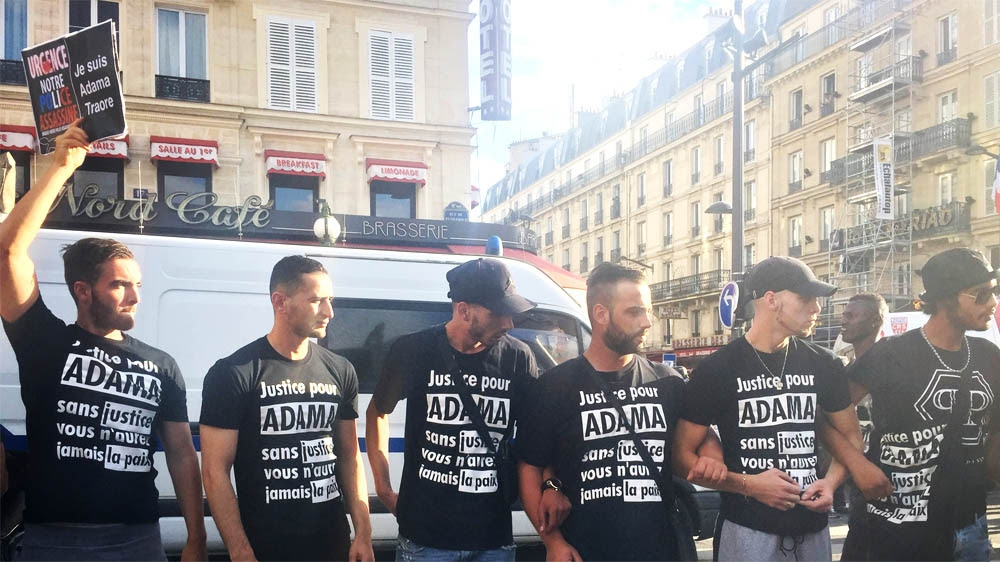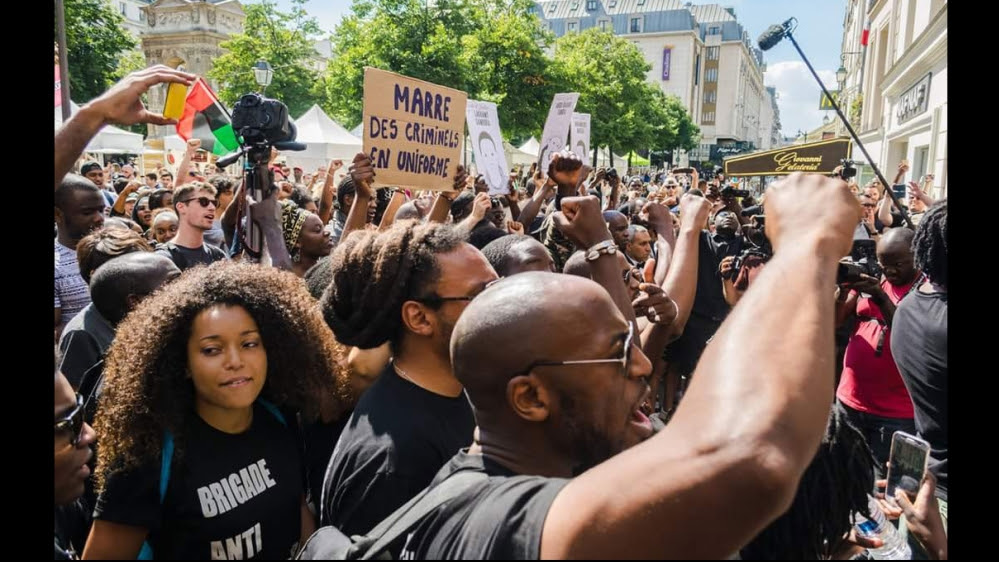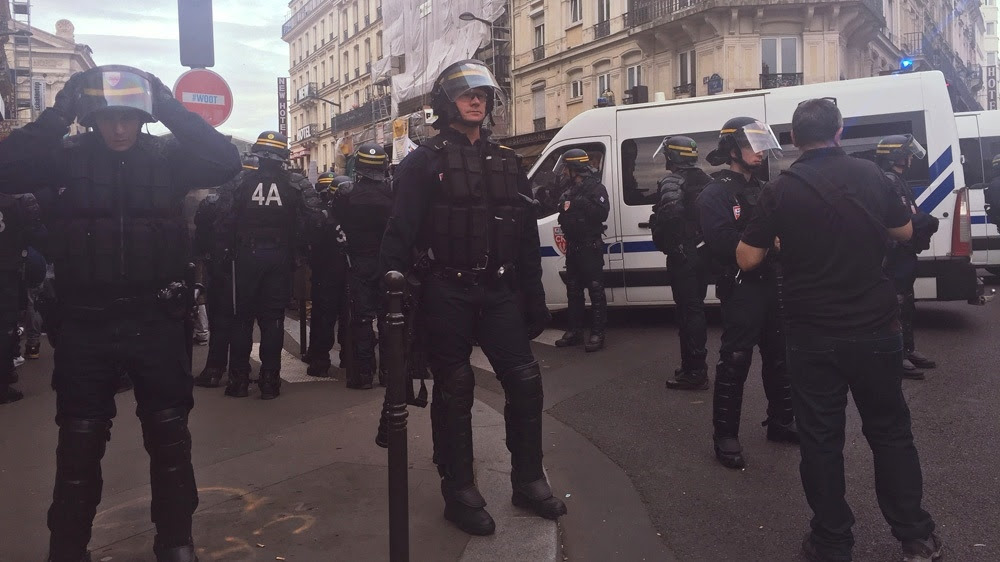By Nabeela Zahir

Paris, France – Young protesters gathered for a demonstration at Gare Du Nord in the heart of Paris. Amid a heavy police presence, they defiantly chanted “Black Lives Matter” and called for justice following the death of Adama Traore while in police custody.
“The French police are killing our brothers, Adama didn’t even do anything wrong. He was killed at the hands of the ones who were supposed to protect him,” said one demonstrator.
The 24-year-old French-Malaian died on July 19, shortly after his arrest in Beaumont-sur-Oise, a suburb on the edge of Paris. He had been taken into custody after allegedly interfering in the arrest of his brother who was wanted in connection to an extortion case.
The details of his death are murky. Traore’s family says that he entered the police van alive, only to be found dead at the station shortly after. French prosecutor Yves Jannier, said that Traore had “fainted during the ride” to the police station and although paramedics were called immediately, they were unable to revive him.
Initially the police claimed that he had died of a heart failure. Later, Jannier said Traore’s death was caused by a serious infection which “impacted several organs”.
But an autopsy indicated that the cause of death was asphyxiation.
 |
| Demonstrators wear T-shirts demanding justice for Adama after the death of the 24 years old in July [nabeela zahir/Al Jazeera] |
According to police documents, three police officers admitted to “throwing their weight on him”. This meant that Traore had “sustained the weight of three bodies at the time of the arrest,” according to the documents. There has been no confirmation from experts on whether this caused the asphyxiation and death of the young man, but the protesters in Paris are pointing the finger of blame at the police.
“The police killed Adama. We are facing a new case of injustice and it’s not the first time it has happened. We need this to stop. We need justice,” Curtis, a young black man from the suburbs, told Al Jazeera at the protest in Gare Du Nord.
After weeks of protests and demands for a further investigation, the Traore family travelled to their hometown of Bamako in Mali to bury Adama, beside the grave of his father.
News of Traore’s death caused anger and despair in the suburbs. Days of rioting followed and, in July, some members of the local community clashed with police, setting cars and buildings alight.
Black Lives Matter France
In the weeks since Traore’s death the French capital has seen a series of protests with passionate chants of “Black Lives Matter”, a slogan first coined by protesters in the United States in response to police killings of African Americans.
The hashtags #BLMFrance and #Justicepouradama went viral on twitter within the country.
Yasser Louati, a civil liberties and human rights activist from Paris, says that this particular case has resonated with many people and pushed them to demand justice. Years of mistreatment, brutality and policing by what he describes as an “occupying force” has led to a crisis point.
“If people are marching today it is because resentment is very, very profound. Look at how people do not trust the initial police statement, nor the second .They just do not trust the police,” Louati told Al Jazeera.
 |
| Protesters from the Anti-Negrophobie brigade demonstrate against the police in Les Halles, Paris [Courtesy of collectif des Associations Unies Solitaires pour l’Afrique et sa Renaissance] |
The protests in France come as the Black Lives Matter movement takes on an international dimension. Recent protests have been held in the UK , Canada and Germany , with minority communities all voicing similar concerns regarding the treatment of black and brown bodies.
Franco Lollia is an activist from the Anti-Negrophobia Brigade, a group formed to counter anti-black racism in France. He has been leading some of the protests alongside the Traore family and says that there is some link between the Black Lives Matter campaign in the US and the recent protests in Paris, describing it as a “butterfly effect”.
But categorising this movement as a copy of the American one would ignore the unique factors of what exactly is causing such tensions in France. Lollia explains that unlike the US, the current BLM movement is specifically linked to the country’s history of colonialism.
“You can only understand the relationship between minorities and their governance through the prism of colonialism; everything is fitted through this, for example racial profiling. It is an inheritance from France’s colonial past. What we see here today can be described as internal colonialism within French borders,” Lollia says.
Policing communities
In France a person of an African or Caribbean background is six times more likely to be stopped by the police [PDF] than a white person. For a person of Arab origin, the figure stands at eight times higher.
Curtis, the young protester, explained the reality of these figures for a minority living in the suburbs.
“The stop and search levels towards blacks and Arabs are high. As soon as they see you are from a minority they target you. It’s the same for all of us in the suburbs, racial profiling and intimidation by the police. Every day we live like this.”
In 2012, Human Rights Watch published a report showing that police used overly broad powers to conduct what they described as “unwarranted and abusive identity checks on black and Arab young men and boys”. Children as young as 13 were said to be subjected to frequent and invasive stops and searches.
HRW presented evidence indicating that police in France use ethnic profiling when deciding whom to stop, rather than on reasonable suspicion of wrongdoing.
The use of insulting language, including racial slurs, were not uncommon, and some stops involved excessive use of force by the police, the report said. The stops are not systematically recorded by the police, which means the lack of transparency makes it incredibly difficult to assess the effectiveness or lawfulness of any such incident.
Repeated Al Jazeera attempts to solicit comments from police representatives regarding the situation, were unanswered by the time of publication.
 |
| ‘Franco Lollia speaking at a Black Lives Matter Protest in the heart of Paris [Courtesy of collectif des Associations Unies Solitaires pour l’Afrique et sa Renaissance] |
A rallying cry
The recent riots that followed the death of Traore are not the first time the French capital has seen such unrest in the suburbs – known locally as ‘banlieues’. In 2005, a state of emergency was issued after weeks of rioting following the death of two teenagers, Bouna Traore and Zyed Benna.
The pair was electrocuted while hiding from the police at an electricity substation in the Parisian suburb of Clichy Sous Bois. An independent inquiry held after their deaths found that the friends were entirely innocent. Yassir Loutani believes that their case is an example of the fear that some young people feel towards the police.
“They fled the police and died, but nobody questioned why young people would have run, even if they did nothing wrong. There is a feeling that if the police catch you they can beat you, leave you for dead and nothing will happen to them,” says Loutani.,
After a decade of legal battles by the families of Zyed and Bouna, a French court cleared two police officers of failing to help the teenagers – with the judge dismissing charges of them failing to assist someone in danger. No one was held accountable, leaving behind what protesters describe as “a deep wound in the psyche of people” from minority backgrounds in France.
But this mistrust is not the only reason that some feel such alienation from French society. Many saw the unrest that followed the deaths of Traor and Benna as a reaction to years of marginalisation felt by some of the most impoverished communities in the country.
Banlieues are home to many of France’s minorities. They are a sea of high-rise buildings engulfed in inequality where the poor are housed.
Currently youth unemployment in France stands at about 23 percent, but Yasser Loutani says that in the banlieues the figure is much higher at over 40 percent.
Protest leaders at the BLM demonstrations believe that it is this inequality which is leading to such frustration and resentment.
 |
| Riot police gather at the Black lives Matter Protest at Gare Du Nord, Paris nabeela zahir [nabeela zahir/Al Jazeera] |
In 2015, President Francois Hollande promised to end the inequality that exists in the suburbs, while Prime Minister Valls has described the racial divide in France as “territorial, social and ethnic apartheid”.
But many young people attending the BLM protests who currently live in the suburbs, feel that the current government has not worked to improve the situation, and that nothing has changed over the past decade.
Yassin and Mohammed, two teenagers from a suburb in the north of Paris, explained how they feel “cast aside”.
“We are left out of opportunities, and there is no second chance through education because France is just too elitist. Nothing has changed since 2005; in fact things are even worse,” they said.
There is a feeling among the BLM protesters in France that depending on the police to rebuild trust with minority communities is not enough to stop things from spiraling out of control again, leading to further riots and unrest in the suburbs.
A greater level of transparency and accountability regarding the way in which they are governed won’t come about unless the people demand it. Access to education and employment for young people in the banlieues is the only way to close the inequality gap, which fundamentally will empower minority communities, the demonstrators say.
They argue that there is much that can be gained from unity, joining an international movement in what can be considered a shared experience of the treatment of minorities in Western societies can only serve to strengthen their struggle.
Preview YouTube video Anger in France over black man’s death in police custody
















